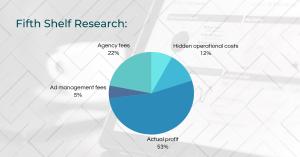Fifth Shelf Analysis Reveals Amazon Brands Lose Average 47% of Profit Margin to Agency and Operational Fees
Tampa-Based E-commerce Accelerator Publishes Industry Research on True Cost of Marketplace Management
The analysis, which examined fee structures from 50 marketplace service providers and surveyed operational costs across multiple brand categories, identified five primary cost centers that systematically erode brand profitability: agency management fees (15-30% of revenue), advertising management fees (3-5% on top of ad spend), setup and onboarding fees ($5,000-$25,000), monthly retainers ($2,500-$10,000), and hidden operational costs including stockout penalties and cash flow delays.
"Brands often evaluate agency partnerships based solely on the management fee percentage, but that represents only a fraction of the true cost," said Atahan Kangal, founder of Fifth Shelf. "When factoring in all fees, minimum commitments, and opportunity costs from delayed payments, the actual impact on profitability becomes substantial."
The research methodology included analysis of publicly available pricing from leading Amazon agencies and amazon account management services providers, anonymized fee assessments from 200 marketplace sellers, and operational cost modeling based on standard industry practices. The study focused on brands with annual marketplace revenue between $500,000 and $10 million, representing the core mid-market segment most affected by fee structures.
Key findings from the analysis include:
Agency Management Fees: Traditional agencies charge between 15-30% of gross revenue for marketplace and amazon brand management services. For a brand generating $2 million annually, this translates to $300,000-$600,000 in management fees alone.
Advertising Cost Overruns: Beyond the actual ad spend, agencies charge additional fees of 3-5% for campaign management. With Amazon advertising costs averaging 15-20% of revenue, brands face compound fees that significantly impact profitability.
Setup and Migration Costs: Initial onboarding fees range from $5,000 for basic setup to $25,000 for complex catalog migrations. These one-time costs often come with 6-12 month contract commitments.
Monthly Retainer Burden: Minimum monthly retainers create fixed costs regardless of sales performance. During seasonal slowdowns, brands continue paying $2,500-$10,000 monthly even when revenue declines. The analysis found that 68% of brands reported paying full retainers during months with negative growth.
Hidden Operational Inefficiencies: The most significant costs stem from operational gaps. Stockouts result in average revenue losses of 12% annually. Payment delays from marketplaces create cash flow constraints that prevent optimal inventory purchasing, leading to an estimated 8-15% opportunity cost.
The cumulative impact varies by business model and category, but the analysis revealed consistent patterns across industries. Beauty and personal care brands faced the highest total costs at 52% of profit margin, while home goods brands averaged 43%. Electronics brands, despite lower agency fees, lost 49% to operational inefficiencies and competitive advertising costs.
"The marketplace ecosystem has created a complex web of interdependent services, each taking their cut," explained Kangal. "What started as simple percentage-based fees has evolved into a multilayered cost structure that many brands don't fully comprehend until they analyze their true profitability."
The timing of this analysis coincides with increasing pressure on marketplace sellers. Recent data from Marketplace Pulse indicates that while third-party seller revenue on Amazon grew 20% year-over-year in 2024, average profit margins declined by 8%. This margin compression, combined with rising advertising costs and increased competition, has forced brands to scrutinize their operational expenses more carefully.
Industry response to these findings has been mixed. Several agency representatives defended their fee structures, citing the complexity of marketplace management and the value of expertise. However, brand owners expressed frustration with the lack of transparency and alignment in traditional models.
The analysis also examined emerging partnership models designed to address these challenges. Direct wholesale partnerships, where service providers purchase inventory upfront and invest their own capital in growth, eliminate many traditional fee structures. Revenue-share models that align partner compensation with actual performance are gaining traction among growth-focused brands.
International comparison revealed that U.S. brands face higher service costs than their counterparts in Europe and Asia. UK-based brands typically pay 35% in total fees, while Asian brands operating in their home markets average 28%. This disparity reflects both market maturity and competitive dynamics in different regions.
Small brands face disproportionate impact from fixed costs. The analysis showed that brands under $1 million in annual revenue often pay effective rates exceeding 60% when combining all fees and operational costs. This creates barriers preventing emerging brands from achieving sustainable scale.
Fifth Shelf's research suggests that brands should evaluate total cost of partnership rather than headline fee percentages. The company recommends brands conduct quarterly profitability analysis to understand true operational costs.
Looking forward, the ecommerce service industry appears headed for transformation. Pressure from brand owners, combined with new entrants offering alternative models, suggests that traditional fee structures may become unsustainable. The analysis predicts consolidation among agencies and evolution toward performance-based compensation models.
The complete findings, including detailed methodology and category-specific breakdowns, demonstrate the need for greater transparency in marketplace partnerships. As ecommerce continues to mature, the relationship between brands and service providers must evolve beyond traditional vendor arrangements to true strategic partnerships.
Fifth Shelf operates a Direct Wholesale Partner model where it purchases inventory upfront from brands at wholesale prices and invests its own capital in advertising and optimization. This approach eliminates traditional agency fees, monthly retainers, and setup costs while aligning success metrics between partners. The company currently manages over 10,000 SKUs across Amazon, Walmart, and other major marketplaces.
About Fifth Shelf
Fifth Shelf is an ecommerce accelerator headquartered in Tampa, Florida, serving consumer brands across multiple marketplace platforms. Through its Direct Wholesale Partner model, the company provides upfront capital, marketing investment, and operational support without traditional service fees or long-term contracts. Founded in 2021 by former top-performing marketplace sellers, Fifth Shelf focuses on aligned partnerships where success is measured by actual sales performance rather than service hours or retainer fees. The company offers comprehensive marketplace management, fulfillment services, and global expansion support.
Media Contact:
Public Relations
Fifth Shelf
Phone: (800) 680-0760
Email: pr@fifthshelf.com
Website: https://www.fifthshelf.com
Public Relations
Fifth Shelf
+1 415-606-9054
pr|fifthshelf.com| |pr|fifthshelf.com
Visit us on social media:
LinkedIn
Legal Disclaimer:
EIN Presswire provides this news content "as is" without warranty of any kind. We do not accept any responsibility or liability for the accuracy, content, images, videos, licenses, completeness, legality, or reliability of the information contained in this article. If you have any complaints or copyright issues related to this article, kindly contact the author above.
7-Day-Notary.com Expands Certified Loan Signing Agent Services Across Los Angeles, Orange, and Riverside Counties
Savor the World’s Finest: Kobe Beef Steak Ishida Expands Premium Teppanyaki Dining in Japan’s Top Cities
GPT-OSS-120B & 20B Models Now Available on GPT Proto Platform
Więcej ważnych informacji
 Jedynka Newserii
Jedynka Newserii

 Jedynka Newserii
Jedynka Newserii

Polityka

D. Joński: Nie wiemy, co zrobi Rosja za dwa–trzy lata. Według duńskiego wywiadu może zaatakować kraje nadbałtyckie i musimy być na to gotowi
Zdecydowana większość krajów unijnych wskazuje na potrzebę wzmocnienia zdolności obronnych Europy w obliczu coraz bardziej złożonego geopolitycznego tła. Wywiady zachodnich państw wskazują, że Rosja może rozpocząć konfrontację z NATO jeszcze przed 2030 rokiem. Biała księga w sprawie obronności europejskiej „Gotowość 2030” zakłada m.in. ochronę granic lądowych, powietrznych i morskich UE, a sztandarowym projektem ma być Tarcza Wschód. – W budzeniu Europy duże zasługi ma polska prezydencja – ocenia europoseł Dariusz Joński.
Transport
Duże magazyny energii przyspieszą rozwój transportu niskoemisyjnego w Europie. Przyszłością może być wodór służący jako paliwo i nośnik energii

Zmiany w europejskim transporcie przyspieszają. Trendem jest elektromobilność, zwłaszcza w ramach logistyki „ostatniej mili”. Jednocześnie jednak udział samochodów w pełni elektrycznych w polskich firmach spadł z 18 do 12 proc., co wpisuje się w szerszy europejski trend spowolnienia elektromobilności. Główne bariery to ograniczona liczba publicznych stacji ładowania, wysoka cena pojazdów i brak dostępu do odpowiedniej infrastruktury. – Potrzebne są odpowiednio duże magazyny taniej energii. Przyszłością przede wszystkim jest wodór – ocenia Andrzej Gemra z Renault Group.
Infrastruktura
W Polsce w obiektach zabytkowych wciąż brakuje nowoczesnych rozwiązań przeciwpożarowych. Potrzebna jest większa elastyczność w stosowaniu przepisów

Pogodzenie interesów konserwatorów, projektantów, inwestorów, rzeczoznawców i służby ochrony pożarowej stanowi jedno z największych wyzwań w zakresie ochrony przeciwpożarowej obiektów konserwatorskich. Pożary zabytków takich jak m.in. katedra Notre-Dame w Paryżu przyczyniają się do wprowadzania nowatorskich rozwiązań technicznych w zakresie ochrony przeciwpożarowej. W Polsce obowiązuje już konieczność instalacji systemów detekcji. Inwestorzy często jednak rezygnują z realizacji projektów dotyczących obiektów zabytkowych z uwagi na zmieniające się i coraz bardziej restrykcyjne przepisy czy też względy ekonomiczne.
Partner serwisu
Szkolenia

Akademia Newserii
Akademia Newserii to projekt, w ramach którego najlepsi polscy dziennikarze biznesowi, giełdowi oraz lifestylowi, a także szkoleniowcy z wieloletnim doświadczeniem dzielą się swoją wiedzą nt. pracy z mediami.




![Nestlé w Polsce podsumowuje wpływ na krajową gospodarkę. Firma wygenerowała 0,6 proc. polskiego PKB [DEPESZA]](https://www.newseria.pl/files/1097841585/fabryka-nesquik_1,w_85,r_png,_small.png)




.gif)

 |
| |
| |
|